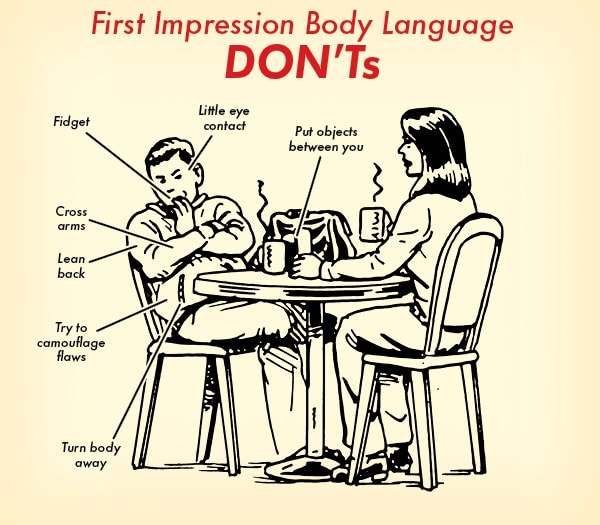
Body Language That Communicates Confidence
Just because you should seek to display openness and a little vulnerability, doesn’t mean you want to come across as timid or docile. On the contrary, being able to demonstrate some vulnerability shows that you feel strong and secure — that you’re not worried about being “attacked” or hurt.
Confidence in general in fact contributes to a more positive first impression for several reasons.
First, when you’re anxious and nervous, this can create a visceral reaction of suspicion in people. They can’t be sure if you’re anxious simply because you’re shy, or because you’re hiding something.
Second, insecurity reads as a potential social cost. As we discussed last time, people like people who are a social benefit, rather than a social burden. Someone who’s insecure is going to be really needy, and need a lot of affirmation. People can instinctively see the kind of energy they’re going to need to divert into constantly buoying the person up, and this makes them want to back away.
Third, confidence is an in-demand resource, not only in ourselves, but in those we associate with. People like to partner up with others who raise their own status. And they like comrades who will help them navigate life with aplomb; everyone wants someone with moxie on their team.
Finally, your comfort level affects that of other people. When you feel anxious and insecure, your demeanor spreads, and the people around you start feeling that way too. Conversely, when you feel relaxed and comfortable with yourself, that helps put other people at ease. The aura of confidence creates a pocket of safety and security, and people want to be in it.
Here’s how to create that aura with your body language.
Don’t try to mask or camouflage something you’re insecure about. If there’s something about yourself that makes you feel ashamed or embarrassed, you may try to cover it up. For example, maybe you’ve got bad teeth, so you never open your mouth when you smile. Or you’re not proud of your flabby body, so you wear a t-shirt when you go swimming.
The thing is, that in trying to mask a physical shortcoming, you not only end up drawing more attention to it, but you also reveal your insecurity. And that’s more unattractive than whatever it is you perceive to be a hideous flaw. People will feel you are self-absorbed, and will thus have insufficient energy to invest in them.
Plus, your efforts to camouflage your flaw may end up reading in a negative direction you didn’t anticipate. So in the example of having bad teeth, others may wonder why you never really smile, and decide that it’s because you’re rather strange and aloof.
Being attractive certainly helps in making a good first impression. But confidence can truly compensate for a lot of physical shortcomings. People are drawn to those who embrace themselves, have fun with their flaws, and really don’t seem to give a damn. As Wood advises, “You make yourself more attractive when you show comfort in your own skin, and show pride rather than shame.”
The more you expect to be found appealing, the more you will be.
Practice poise. You may think of poise as something practiced by debutantes, but it’s a quality that benefits both sexes. When you’re constantly fidgeting — tapping your foot, biting your nails, touching your moustache, cracking your knuckles, etc., you come off as anxious. When you repose with a regal stillness, you become an oasis of calm, stately confidence.
...[ Continue to next page ]
Share This Post














